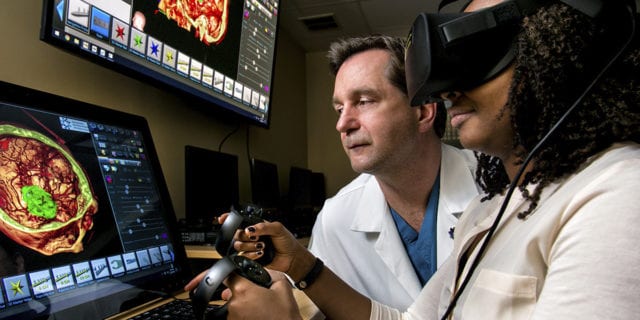The Neuroscience Institute at JFK Medical Center Takes Leadership Role in Development of Multidisciplinary Care Approach and Establishment of Best Practices
Neurologists actively contribute to pioneering research, national medical conferences and scientific journals
The Neuroscience Institute at JFK Medical Center Institute has long taken a leadership role in the development of multidisciplinary care approach and establishment of best practices.
The use of surgical theater at JFK is changing the surgery experience for both patients and surgeons. When employing the virtual reality tool, brain surgeons treating hemorrhaging have reported changing their approach at least 30 percent of the time. New advances in surgical theater allow 3D virtual reality to be injected into the operative microscope creating an augmented reality where physicians can literally see through tissue and around corners. This helps maintain focus on the surgical site as relevant data is overlaid on the live image, allowing the surgeon to never take their eyes off the patient. JFK Medical Center will be one of only 10 sites nationally to have this technology. Thomas Steineke, M.D., Ph.D., Chair of JFK Neuroscience Institute, will be presenting a research paper that demonstrates how the use of 3D simulation in surgical planning reduces operative time by more than one hour and helps to predict which surgical clips to use intraoperatively.

Also of note, the Neuroscience Institute at JFK Medical Center participated in the DAWN trial and was the first center in the United States certified to use the wearable, portable and innovative Optune device in treating glioblastoma.
The Brain Tumor Rehabilitation Program is looking at the effect of post craniotomy cardiovascular rehabilitation on patient quality of life and survival in patients with malignant glioma.
Investigators at JFK Medical Center’s Neuroscience Institute are also leading important neuroscience research, including the following:
- A phase II study of ad-RTS-hIL-12 + veledimex in combination with cemiplimab-rwlc (Libtayo®) in subjects with recurrent or progressive glioblastoma
- The TIMELESS Study: A Phase III, Prospective, Double-Blind, Randomized, Placebo-Controlled Trial evaluating the efficacy and safety of Tenecteplase compared with placebo in patients with actue ischemic stroke and evidence of salvageable tissue on their baseline CTP or MR imaging who present in the 4.5 –24 hour time window with an ICA or MCA (M1 or M2) occlusion pRESET for Occlusive Stroke Treatment: A Prospective, Multi-center, Randomized Study to Compare the safety and effectiveness of pRESET to Solitaire in the treatment of stroke related to large vessel occlusion
- Thrombectomy for Emergent Salvage of Large Anterior Circulation Ischemic Stroke: A Prospective, Randomized, Open-Label, Blinded Endpoint Study for AIS patients who have evidence of moderate-large infarct volume (ASPECT 2-5) in anterior circulation
- GlibenClamide for large Hemispheric infarction Analyzing mRS and Mortality
- Randomized, Double-Blind, Placebo-Controlled, Parallel-Group, Multicenter, Phase 3 Study evaluates the efficacy and safety of intravenous BIIB093 (Glibenclamide) for Severe Cerebral Edema following Large Hemispheric Infarction
- A phase 3 STELLAR study –a randomized, open-label study to evaluate the efficacy and safety of eflornithine with lomustine
